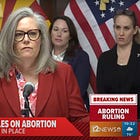Ezra Klein Seems To Think Democrats Should Run More Ellen McCormacks
His bad idea streak continues.
New York Times columnist Ezra Klein is rightly concerned about Democrats’ ability to compete in “red” states, especially as that number steadily grows (e.g. Florida, Ohio, and Iowa). However, his solution is defeatist to say the least and outright stupid to say the most.
Klein told his Times colleague Ross Douthat:
My view is that a lot of people who embrace alarm don’t embrace what I think obviously follows from that alarm, which is the willingness to make strategic and political decisions you find personally discomfiting, even though they are obviously more likely to help you win.
Taking political positions that’ll make it more likely to win Senate seats in Kansas and Ohio and Missouri. Trying to open your coalition to people you didn’t want it open to before. Running pro-life Democrats.
The first sign of trouble is that Klein uses the right-wing propaganda term “pro-life” instead of the far more accurate “anti-choice” or simply “anti-abortion.” The staunchest opponents of abortion are pro-gun, pro-war, and pro-poverty. Congressional Republicans uniformly supported legislation that will impoverish children. That is not in any way “pro-life.”
Klein advises Democrats to run anti-choice candidates in Kansas, Ohio, and Missouri, but these are three states that recently held separate abortion referendums and abortion rights prevailed each time. That seems like something you’d fact check. Yet there was bipartisan support for his strategy. Conservative David French, another New York Times columnist, posted on social media, “Ezra’s completely right. The Democratic Party never should have closed its doors to pro-life voices, and it will never win if it doesn’t run candidates who actually have a chance to compete in red states.” Democrat Neera Tanden agreed, “In 2009, the US Senate had 60 Democratic votes but a lot of them were not 100% pro-choice. Ask yourself if you would feel better with that Senate than this one.”
Fellow UGA alum Zaid Jilani at The American Saga posted, “Ezra is right. In 2010, 1/4 of the House Dem caucus was pro-life. Without those votes Dems cannot build a strong majority.”
These statements misinterpret recent electoral history. Yes, once the Democratic coalition consisted of anti-choice Congress members and governors. The Democratic coalition once contained hardline Southern segregationists. That doesn’t mean we shouldn’t have passed the Civil Rights Act in 1964 or the Voting Rights Act in 1965. I’d like to think that French wouldn’t say, “The Democratic Party never should have closed its doors to anti-integration voices.”
Liberal pundits like Klein in particular want to believe there is one clear policy concession that Democrats could make that would help them win in “red” states. These policy concessions are almost always related to cultural issues that don’t directly impact these white male pundits — abortion, LGBTQ rights, and gun safety. (Obviously, everyone is at risk from gun violence, but the demand for common sense gun legislation remains feminine coded.) This belief isn’t exclusive to mainstream liberals, either. Progressives also seem to think a gun-toting, anti-choice candidate could somehow win Oklahoma and Alabama if they just focused on universal health care and a living wage. (Bernie Sanders reportedly advised Kamala Harris to focus on the working class and not “just abortion,” but reproductive freedom is a major economic issue for working class women.)
However, the Democratic Party’s collapse in “red” America is not directly related to policy. Note that former President Bill Clinton was the governor of Arkansas during the 1980s. He was openly pro-choice barely a decade after Roe v. Wade and he offered a Biblical justification for his belief that life began at birth not conception. His running mate Al Gore was a U.S. senator from Tennessee. He was also pro-choice but he opposed federal funding for abortion. That was considered the moderate position more than 40 years ago. The anti-choice position was the extremist one.
Jimmy Carter, a moderate Democrat from Georgia, expressed his personal opposition to abortion when running for president in 1976, but he also supported legislation that would offer “sex instruction” and expand public access to contraception. That’s far more progressive than the current “abstinence only” anti-choice position.
There’s much discussion about the ideological split among the Republican and Democratic Party over civil rights in the 1960s. However, the 1976 election is perhaps equally important. It was the first presidential race after Roe and Carter coordinated a “non-aggression pledge” regarding the recent Supreme Court ruling. His campaign added the following plank on the party’s platform — under the heading “Civil and Political Rights” rather than “Health Care.”
“We fully recognize the religious and ethical nature of the concerns which many Americans have on the subject of abortion. We feel, however, that it is undesirable to attempt to amend the U.S. Constitution to overturn the Supreme Court decision in this area.”
Carter also successfully kept anti-choice candidate Ellen McCormack off the convention stage.
Conversely, at the 1976 Republican Party convention, Gerald Ford replaced pro-choice Vice President Nelson Rockefeller with anti-choice conservative Bob Dole. The GOP’s platform declared:
“The Republican Party favors a continuance of the public dialogue on abortion and supports the efforts of those who seek enactment of a constitutional amendment to restore protection of the right to life for unborn children.”
The Religious Right officially dominated the GOP after Ronald Reagan’s election in 1980. However, it’s important to note that the national Democratic Party’s overall position on abortion remained both moderate and popular. David French, Ross Douthat, Ezra Klein, and curiously Neera Tanden aren’t suggesting that Democrats support more candidates with abortion views that Jimmy Carter held almost 50 years ago. They’re suggesting that Democrats support candidates with anti-abortion positions that would’ve been considered extreme for many Republicans in the 1980s.
There is a tendency to conflate causation with correlation regarding the period when Democrats’ overwhelming congressional majorities contained members who were anti-abortion. James Zogby, a national advisory board member of Democrats for Life of America, lamented in 2017, “Back in the early ‘90s, when we had 290 members of the House, we had 100-something pro-life Democrats. Today, we’ve got three or four pro-life Democrats.”
Those anti-abortion Democrats weren’t the victims of a pro-choice rout — unlike the Republicans who fell to primary challenges from the right in 2010 and 2014. Those Democrats simply lost to actual hardline Republicans because partisan gravity was asserting itself. Ancestral Democrats in those districts and states were officially moving toward the Republican Party. This had less to do with specific policy issues or even a Black president (at least not entirely) than it did with a larger cultural shift that had taken place over the past 30 years.
House Democrats in “red” districts tried distancing themselves from the national party. Here’s one example that is similar to so many others: Alabama Rep. Bobby Bright ran unopposed in the 2010 Democratic primary and campaigned in the general as “independent and conservative.” He promised he wouldn’t support Nancy Pelosi for speaker again. Not surprisingly, his “Democrats suck. I’m not actually one of them” platform failed, and voters picked actual conservative Republican Martha Roby. Bright tried running against her as a Republican in 2018, but that didn’t work either.
It’s both ahistorical and incredibly naive to separate the anti-abortion position from religious fundamentalism in general. There’s a reason that Black Southern Baptists, who have the same Bible, are more in line with Carter, Clinton, and Gore on abortion than they are with the white evangelicals who live in the same area. White evangelicalism is now indelibly linked to the MAGA cult. Liz Cheney and Adam Kinzinger are anti-abortion and would easily lose an election to almost any boot-licking Trump lackey. If pro-democracy, anti-choice Republicans can’t defeat unhinged MAGA Republicans in primaries, there’s no reason to think that a Democrat who abandons a woman’s right to choose would do any better.
Centrist pundits have lectured Democrats about embracing “popularism,” but public support for abortion rights has only increased over the years. Bob Dole even backtracked from his support for an unconditional abortion ban when he was running for president in 1996. That’s why not every Democrats in solid “red” states was anti-choice: Mary Landrieu from Louisiana supported abortion rights, as did Blanche Lincoln from Arkansas (though her relationship with pro-choice groups was complicated).
Robert Byrd from West Virginia voted against Republican efforts to reverse Roe back in 1982. He was moderate to conservative on abortion rights but not an outright abortion opponent. Democrats who were staunch abortion foes were a different case entirely when Roe was still the law of the land. In our current horrible Dobbs reality, Republicans have passed draconian abortion bans, and we need Democrats who will actively work to protect women’s health and their bodily autonomy.






Support for legal abortion is the most popular position the Democratic Party has, including in Republican states, based on every election since actual abortion prohibition became an issue (vs. squishy declarations of being pro-life, with the corresponding ability to get an abortion when you and/or your partner wants one). If the Democratic Party starts backing candidates that are supportive of laws that lead to pregnant women bleeding out in parking lots, I'm out, as protecting people I care about from that is basically the only reason for me to support the national party these days.
I'd love someone to ask these men what fundamental human right they personally would be willing to sacrifice to help the Democratic Party win.
Pro guns, pro oil, pro war, pro prison individuals are not pro life.
You said it better but yeah.
Dan Savage (of all people!) hosted wolf in blue clothing Ezra Klein on his podcast last spring and Klein said people should stop making their politics their whole personality. I was freaking outraged that this rich white dude, who was referring to trans people who are FIGHTING FOR THEIR GODDAMNED LIVES was spouting this shit. I wonder how much if his "personality" is being wealthy and powerful? Imagine the rukkus he would constantly make if his money was taken away!